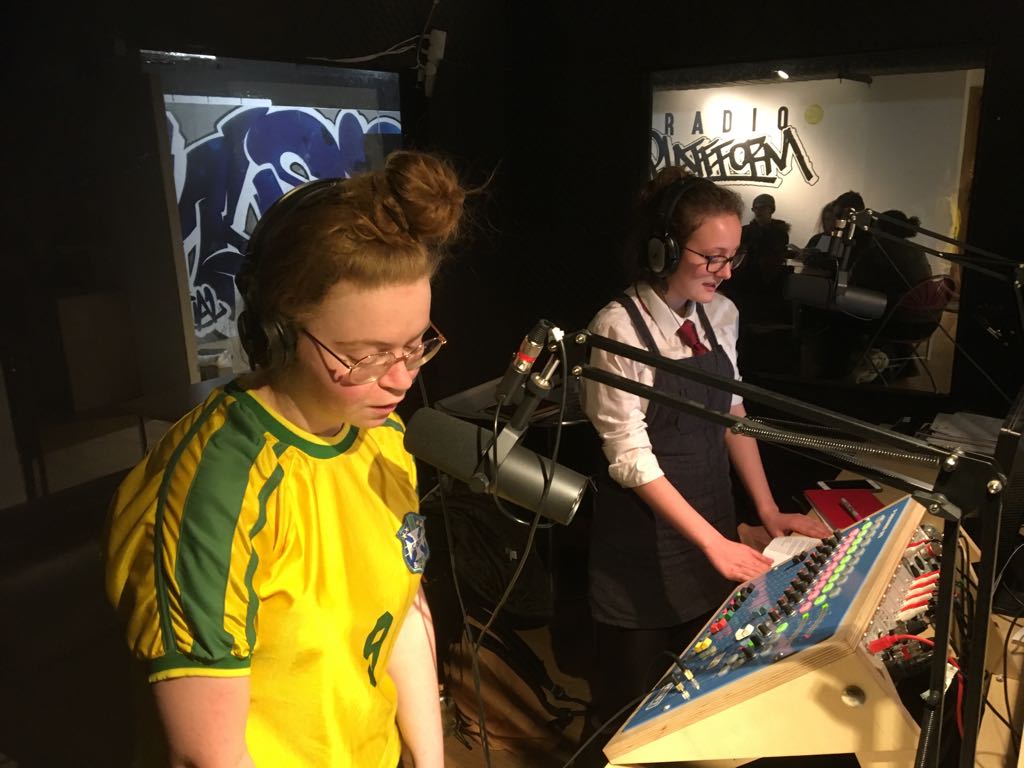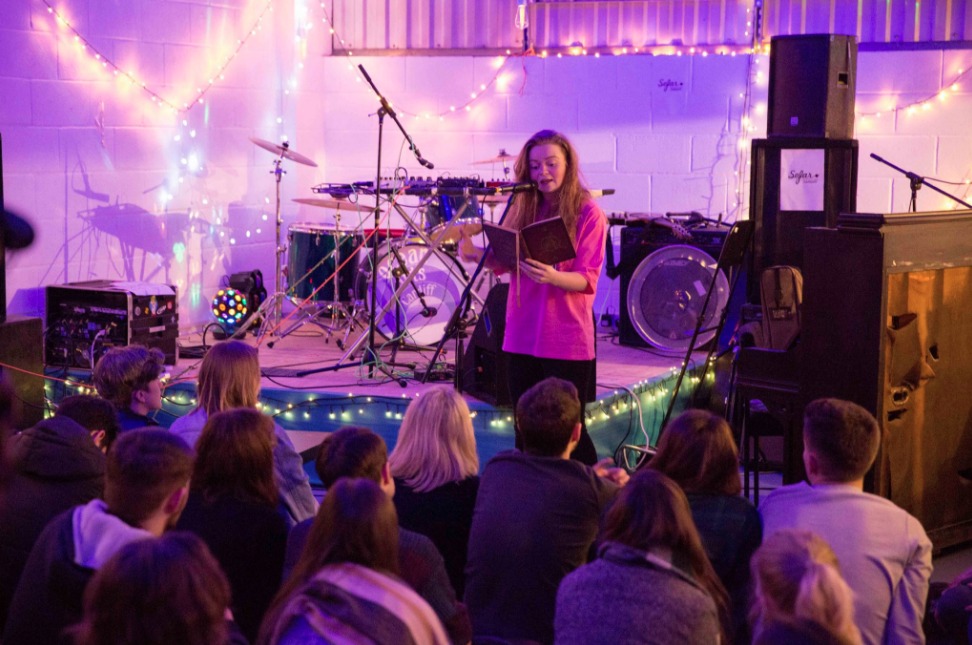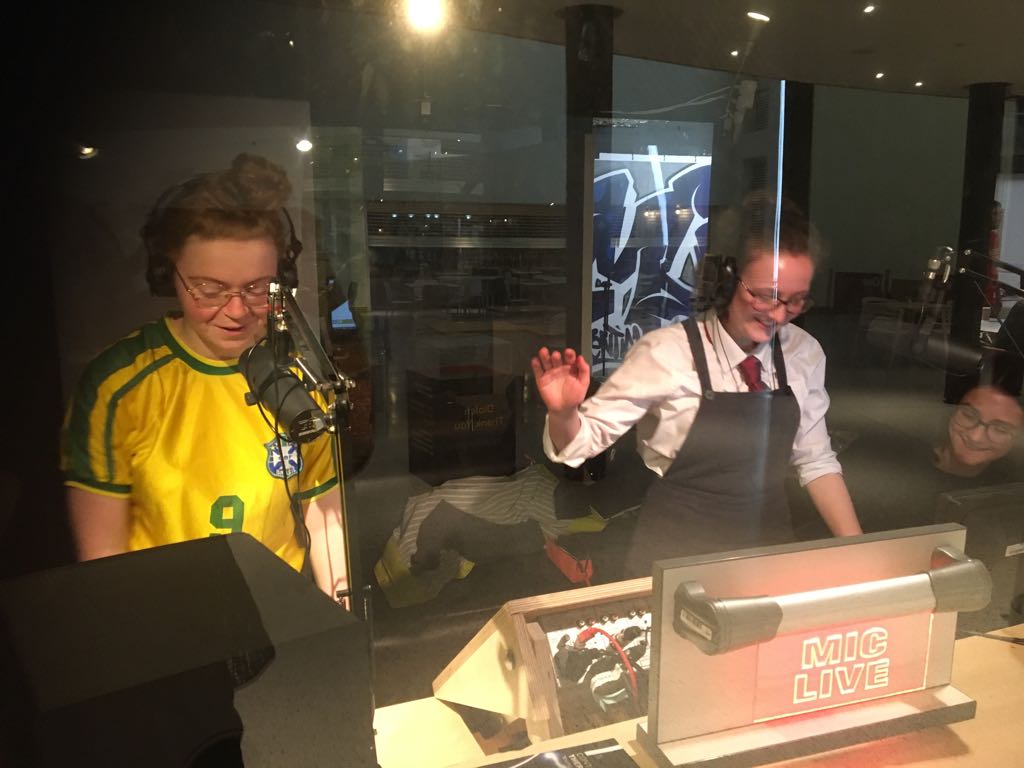I have recently started a new series on my Radio Platfform show, Meaningless Culture Drop, called Spotlight. The purpose of this series is to interview many of the new artists that are popping up all over the South Wales areas of Cardiff, Newport and the Vale, as well as doing a brief showcase of their work, whether it be music, poetry or whatever.
My first artist is the very exceptional spoken-word poet, Sarah McCreadie. She’s just back fresh from opening at the Milk and Raison Bar in Bristol and has recently performed at Weston Studio at the WMC and she’s a person who is very special to those of here at Radio Platfform and I’ll tell you just how special.
Back in October 2017 I had conducted an over-the-phone interview with Amber Run guitarist Joe Ahearne. I was then in line to review their upcoming performance at the Tramshed. But then I found out that Sarah would be one of the opening support acts for Hollie McNish at Ffresh on the same night, the other being the poet and author Vanessa Kisuule.

After that it was no contest, nuts to Amber Run was my response, there was no way that I was going to miss out on seeing Sarah McCreadie live, even if it was just in support. I have since been a keen follower of her work both as a spoken word poet and as a presenter here at Radio Platfform of Girls, Girls, Girls! So when I decided to start up this new series I could think of no-one better to begin with.
I began by asking her about her background, who she is, where she’s from and anything else she could think of?
I’m from Cardiff, I’m a poet and I’ve been doing it a really long time really but it’s only in the past couple of years, I mean I’ve been writing my whole life, but it’s only in the last couple of years that I’ve kinda started performing and doing all sorts of stuff with it and it’s taken me to all sorts of places.
So when did you first become interested in both poetry and spoken-word poetry?
I think to me they’re kinda the same thing. I reckon my first start when I first fell in love with poetry I suppose, I always picture myself walking to school by myself and I was completely influenced by like sounds and beats, like my feet on the wet pavement and putting words in my head and I would kinda rhyme constantly. I’m an only child man so I spent a lot of time by myself and I would narrate things and make things sound real pretty, you know. And that kinda has always stayed with me I suppose, I’ve always got that inner monologue inside my head where I’m trying to paint pictures with what I’m seeing you know.
https://twitter.com/sofarcardiff/status/957638815396651008
So when did you first start performing?
My first performance was in November 2015, as I said I’ve been writing my whole life and before then I was kinda always performing in my bedroom to nobody and I definitely knew that I wanted to do this and I was looking for an avenue in which to try this stuff out, you know like an opportunity. And I found it. I saw an ad for a project called Words First which was being run at the Roundhouse Theatre in London and BBC 1Xtra. And they were looking for poets, young poets, for a week long course, like an intensive poetry course, including spoken-word, basically to end up with you on-stage doing a performance. And I went for it, I got it and that whole week completely changed my life. From then on I met people there, which lead me to do another performance, and then people would meet me there and like what I was doing so I would end up doing another performance.
So what kind of themes and subjects do you cover in your poetry and also what kind of style does your performance take on?
I would say that I talk about what’s real to me and what’s around me and things I care about. I talk about my girlfriend, about my family, about women, about girls, about feminism. I talk about being working class in this country, I talk about football man and about anything else that’s on my mind. And as for style I think there’s the obvious influence of rap and hip-hop. I really care about rhythm and flow and imagery, bold imagery, you know, I wanna tell you a story by taking something really familiar and make you see it in a way that you’ve never seen it before, if that makes sense. Like say if I was to show you an onion I would write a poem about…
Peeling back some layers maybe?
Yeah exactly, in a whole other way. Although I think that I smell better than an onion, or at least I hope so.

So what was your first passion then within that scope? What was the first concrete thing that drew you in and made you say “I have to write this poem!”?
Interesting. Well, the first ever poem that I can remember writing, and being published because it was in a primary school anthology of students work, I was nine years old and it was called ‘Dizzy Dragons’ and it was just loads of D’s, so completely about alliteration you know. I think I rhymed dizzy with ITV or something like that and basically I was reading it not so long ago and whilst I was only nine years old at the time it felt like something I’d write today. I’m not sure what exactly drove me to write something like that, but it was called “Dizzy Dragons” and I wish that I’d brought it with me today so you could have a listen to it. But it pretty much sounds like something I could’ve written like five minutes ago… I don’t know what that says about me though.
I suppose that’s good, because it shows a consistency of style. I mean if you feel that something like that still speaks to you, even though it was written all those years ago then it must mean you’re doing something right, because people will still be able to identify your style fifty years from now, if it lasts that long.
I hope so, I think I’ll always be doing it. Because that poem had things in it like “Dizzy dragons, dead damsels, etc.” I mean it had a flow to it, man, and I didn’t even know it. I also went to the Eisteddfod when I was that age in my primary school as well, so education was like my first introduction to poetry itself and I think that I kinda found a real passion for it, and for music, and rhythm and rap and to me it’s all in the same swimming pool.
Well speaking of music do you have a favourite genre or at the very least a favourite artist or something like that?
Oh, well I like all sorts…
OK, then well let me rephrase that… If there is a certain piece of music that you like, why do you like and why is it special to you?
Oh, that’s good. Um… that’s a good way of putting it, so like what kinda draws you to music, right? I think lyrics have always been pretty powerful to me, big surprise right. So I love like imagery and turn of phrase and really solid lines that stick out. So in terms of artists I think the people for me were Simon & Garfunkel, my Dad used to play them when I was a kid, and I mean Paul Simon’s a poet isn’t he. And there’s another song called ‘Romeo and Juliet’ by Dire Straits and there’s a line in it that’s always stuck with me and it goes: “All I can do is kiss you, through the bars of a rhyme.”And I was like ‘Oh my goodness’ when I heard that and that’s the kind of thing that sticks with me and I never forgot that line and it was just the most beautiful thing.

I quite like Dire Straits too, although I prefer Tunnel of Love. So are there any other favourite tracks that you like in particular?
Well in terms of like Simon & Garfunkel I always liked America, I loved The Boxer, Cathy’s Song, they’re poetry to me. I just wanna here something that can make me feel something, that’s what I’m looking for, I’m a terrible romantic don’t you know.
In that case how do you feel about new spoken-word artists? Because I’m not very familiar with them but the ones I have heard of are John Cooper-Clarke and this new guy called George the Poet and he did a great poem that I like called ‘YOLO’. So do any people like that speak to you? Do you find inspiration in the modern stuff as well as the classic stuff?
Yeah, of course, I think if you want to be good at something then you’ve got to learn and you should listen to your peers. I love going to poetry nights and open mics where people can just come up and rip their heart out on stage and it’s always new people that you see all the time. In terms of influence for poetry I’m terrible because I’ve always got that love for like beat-poetry, I mean it’s not modern at all but people like Ginsburg and Kerouac, like I read On the Road and it changed my life, I’m that kind of person. I also honestly love modern poetry and so do a lot of my friends because there are some absolutely incredible people out there. There’s Katie Gill from Portsmouth, you should check her out, man. And I think that when you’re surrounded by poetry, especially all of the new stuff, all of the time, that’s the stuff that’s really exciting to me cause it’s the youth talking about their feelings man and that’s why spoken-word has been given such a great platform.
Well, I also have to ask, because we were talking about this earlier, but how influenced were you by Welsh poetry and do you think it was important for you being brought up in Wales with its legacy of poetry?
I think the way that poetry maybe is taught in schools, at least it was I think for me around about that era, cause I think that we were maybe in school at the same time…
Well, I was cruelly ripped away from the Welsh schooling system to Nottingham for all of my junior school days, so I’m afraid I wouldn’t know.
Basically we used to have a lot of Tennyson and stuff like that so we didn’t really have a lot of modern Welsh language poetry and it wasn’t until I got to university that they did a Welsh-writing in English course where we were presented with a lot of Welsh writers. But I think that one of the reasons that a lot of kids don’t connect with poetry is the way it’s presented to them, you know, so that it’s just dry on the page. I think that if you were to utilise spoken-word with modern poetry in the schools then that would really help connect young people to poetry just so that they could see some of the similarities between it and rap music and the issues that people are talking about, you know. Because there’s only so many times that you can hear a war poem when you’re eleven, twelve, thirteen, I mean you’re not really gonna feel that in your bones, man. I think that’s what we need to do and my feelings about it are obvious since I didn’t take a lot of that school poetry with me in my life any further than the classroom.
As far as I’m concerned all you need is a microphone at a poetry night and to me that has always been the working classes voice.
I got that feeling too. In fact when I did come back from Nottingham I was put into Llantwit Major Comprehensive and of course they showed us all of the classics during English literature, John Steinbeck’s Of Mice and Men and George Orwell’s Room 101 and then when they get to poetry they show you Wilfred Owen’s war poems, in particular, Dulce et Decorum est, and it was this experience of exclusively reading only the war poets that put me off poetry.
I think that’s a common thing, man.
But it wasn’t the Latin that put me off you see, it was just that I thought why on Earth would the only poetry that you would want us to read would be war poetry? Because for me that kind of poetry can only ever cover that one subject. And sometimes they’re all the same and I sort of wish that I’d had that book there (Poetry 1900-2000 Library of Wales) because it would have shown me poets like Dylan Thomas, who I was going over last night. And I kept being drawn towards And death shall have no dominion and Do not go gentle into that good night. And I was thinking why did nobody ever show me this when I was in my formative years because this was a much more comforting idea of poetry than people like Wilfred Owen, because although they both have to do with death they also manage to cover them in completely different aspects. The former is saying ‘Yes, you’re going to die, but death is not the end and life will go on’. But the latter is ‘Yes, you’re going to die, but don’t just accept it meekly, fight for every last breath.’
I think that’s a really good point that. I mean, obviously no disrespect to those war poets or anything like that, but I think if you want a child to really connect with something, or a young person to really connect with something, you have to find some kind of common ground. And you’ll find that all over, especially in a book like this, I mean you’ll find some folks that’ll just be talking about Cardiff man and it’s really as simple as that. You’re looking for a gateway into it and I think that showing the same poets over and over again ends up giving an elitist impression of poetry, because they’re mostly men, they’re mostly white, and there’s nothing wrong with that in terms of the poetry but you can see why poetry is perceived as an elitist when really it’s not, at least to me. As far as I’m concerned all you need is a microphone at a poetry night and to me that has always been the working classes voice.
I got a sense of that myself, at that event at Ffresh in October, because I don’t think a man would ever write a poem where the tag line was “He’s not worth shaving your arse-hole for.”
That was Vanessa Kisuule wasn’t it. That was amazing.
Wasn’t it just. Now before we finish up, we were talking about your past and present poems, but now I’d like to talk to you about the future. Do you have any upcoming projects that you’re looking forward to?
Yeah, I think it’s constantly changing there’s always stuff going on it seems. I do lots of gigs all over, I just want to go to as many places as possible and poetry’s a good way to do that, man. So I’ve got lots of gigs coming up and I think I’m still a resident artist at the Roundhouse in London until around about some time in April, so there’s lots of stuff going on there. And I’ve just done a project with MEIC, which is a hotline for young Welsh people to call in with their problems, and they asked me to write a poem about something they hear about quite a lot, which I did do and that’s called “Butterflies.”
Sarah would, of course, go on to give me a live rendition of said poem, “Butterflies”, but before she did I went on to ask her just one more question, the question that I’m going to be asking all of the artists that I interview for this series and that is: Where do you see yourself in three years?
Wow, three years? Um… I’ll definitely still be writing poetry and there’ll definitely be better ones than they are now. That’s what I’d like.
For more information of Sarah McCreadie’s upcoming performances go to: https://www.facebook.com/pg/Sarah-McCreadie-Fan-Club-1396862680357770/posts/?ref=notif.
Related Articles:
http://www.promo.cymru/relationship-butterflies/




